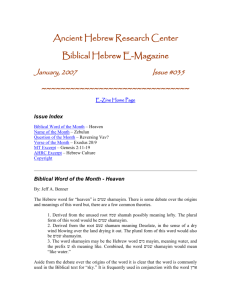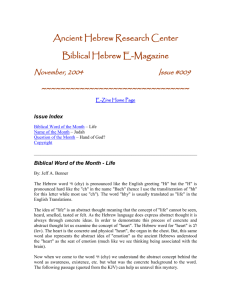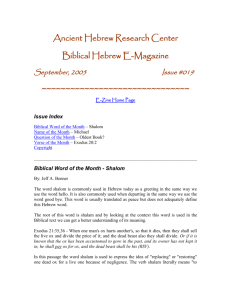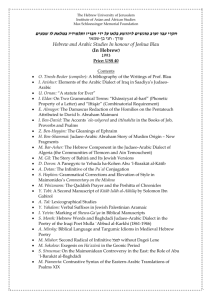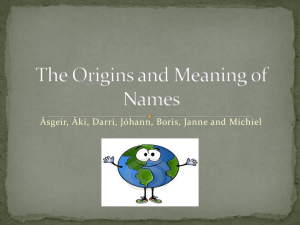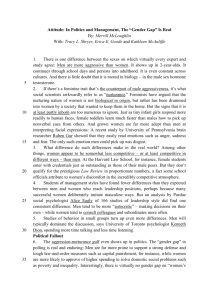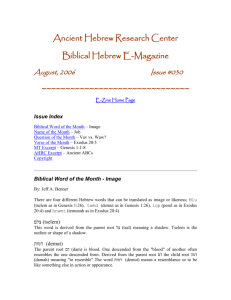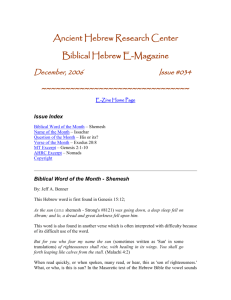Biblical Hebrew E-Magazine - Ancient Hebrew Research Center
advertisement
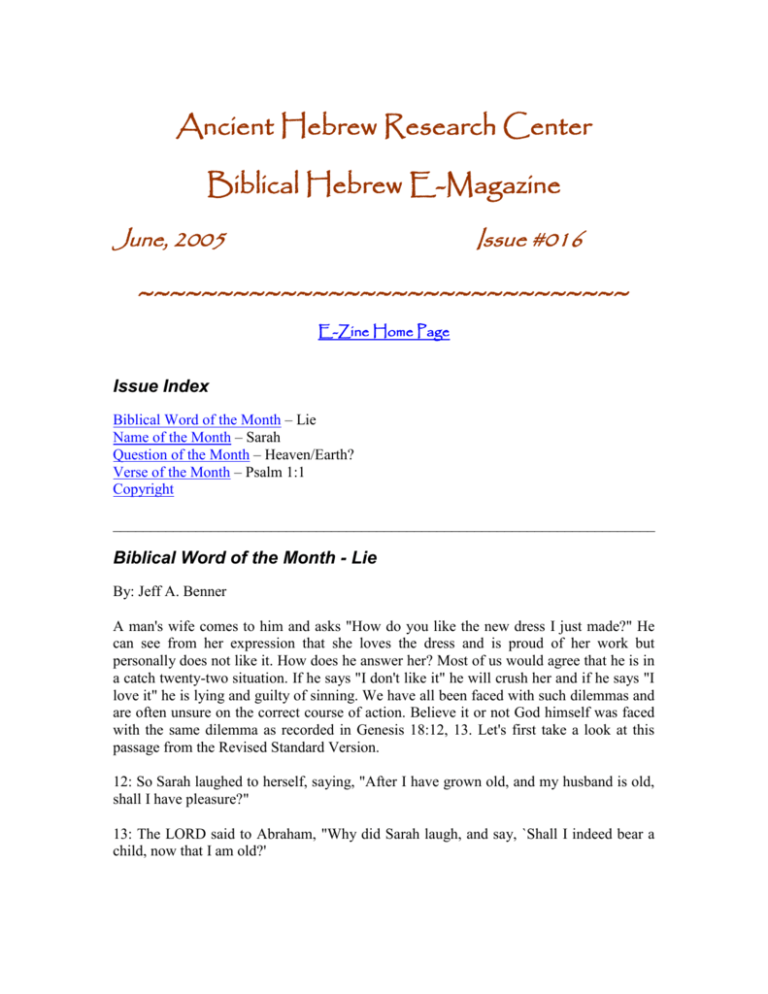
Ancient Hebrew Research Center Biblical Hebrew E-Magazine June, 2005 Issue #016 ~~~~~~~~~~~~~~~~~~~~~~~~~~~~~~~ E-Zine Home Page Issue Index Biblical Word of the Month – Lie Name of the Month – Sarah Question of the Month – Heaven/Earth? Verse of the Month – Psalm 1:1 Copyright ________________________________________________________________________ Biblical Word of the Month - Lie By: Jeff A. Benner A man's wife comes to him and asks "How do you like the new dress I just made?" He can see from her expression that she loves the dress and is proud of her work but personally does not like it. How does he answer her? Most of us would agree that he is in a catch twenty-two situation. If he says "I don't like it" he will crush her and if he says "I love it" he is lying and guilty of sinning. We have all been faced with such dilemmas and are often unsure on the correct course of action. Believe it or not God himself was faced with the same dilemma as recorded in Genesis 18:12, 13. Let's first take a look at this passage from the Revised Standard Version. 12: So Sarah laughed to herself, saying, "After I have grown old, and my husband is old, shall I have pleasure?" 13: The LORD said to Abraham, "Why did Sarah laugh, and say, `Shall I indeed bear a child, now that I am old?' Biblical Hebrew E-Magazine From this translation we do not see a problem, Sarah laughed because she admitted that she was "old". When God goes to Abraham he asks him why Sarah laughed and said she was "old". This is again the translators' way of removing what appears to be a problem with the text. In verse 12 the phrase "grown old" is the Hebrew word "balah" (Strong's # 1086) and means to wither away. The word "old" in verses 12 and 13 is zaqen meaning "old". We now see that Sarah laughed because she admitted she was "withered" and her husband was "old". When God goes to Abraham he asks him why Sarah laughed and said "she" was "old". Sarah never said she was "old". Did God "lie"? It would appear so but, in Numbers 23:19 we read "God is not a man and lied". God cannot lie yet we see him lying in Genesis 18. The problem is not with the text but with our view of a lie. The Hebrew word for "lied" in Numbers 23:19 is kazav (Strong's # 3576). By looking at another verse using this same word we will see that this word does not literally mean "lie". Isaiah 58:11 says; "you shall be like a watered garden, like a spring of water, whose waters never fail". The word "fail" is the same word kazav. The original meaning of kazav is "Vain words spoken to deceive, cause failure or disappoint. What does not function within its intended capacity" (Ancient Hebrew Lexicon of the Bible). A spring that does not flow is a "lying" spring because it does not function properly. One who gives vain words is a "liar" and one who causes disappointment in another through his words is also a "liar". ________________________________________________________________________ Name of the Month - Sarah By: Jeff A. Benner You may be familiar with the phrase "sar shalom" as found in Isaiah 9:6 which is usually translated as "Prince of Peace". The word "sar" is translated various different ways including; prince, captain, chief, ruler, governor, keeper, principal, general, lord and master. The word "sar" is a parent root that literally means "to turn the head". In the original pictographic script the "s" is the letter sin, a picture of a thorn. When traveling and coming across a thorn thicket one must "turn" directions. The "r" is the letter resh and is a picture of the head of a man. When combined the meaning "turn the head" is found in the root "sar". A prince, captain, master, etc. is one who turns the head of the people. The word "sarah" is the feminine form of the word "sar". Did Sarah "turn the head" of the people? Yes, but not in the same sense as a captain or master. In Genesis 12:14 we read "When Abram entered Egypt the Egyptians saw that the woman (Sarah) was very beautiful". Sarah turned the head of the people because of her beauty not or commands. 2 Biblical Hebrew E-Magazine _______________________________________________________________________ Question of the Month – Heaven/Earth? By: Jeff A. Benner Q: What does the phrase "heaven and earth" mean? A: This is a Hebrew idiom meaning "all things". It should be remembered that the ancient Hebrew who wrote the Biblical text did not have a conception of the Milky Way Galaxy or the universe. Also they saw the heavens and stars as a canopy or tent covering over the earth. Genesis chapter one is not meant to be a scientific discussion on the origins of the solar system but rather a poetic story about God's involvement with his whole of creation. It is quite possible that there are many Hebrew idioms in the Bible, the problem is that the definition of an idiom is a phrase that has no real meaning and is only understood from the culture the idiom is derived from. What this means is that their may be many other idioms but because we do not know them, we would never know them to be idioms. Therefore we often understand them as literal when they were never meant to be literal. Some idioms are known only because they have survived as idioms to this day. In Israel the expressions "good eye" and "bad eye" are still used to mean "generous" and "stingy". Both of these idioms can be found in both the Old and New Testaments (Proverbs 22:9, Proverbs 23:6, Matthew 6:22,23). ________________________________________________________________________ Verse of the Month – Psalm 1:1 By: Jeff A. Benner ּובדֶׁ ֶׁרְך ְׁ י־ה ִאיש אֲ שֶׁ ר ׀ ל ֹא הָ ַלְך בַ עֲצַ ת ְׁר ָשעִ ים ָ ַא ְׁש ֵר חַ ָט ִאים ל ֹא עָ ָמד ּובְׁ מושַ ב ֵלצִ ים ל ֹא יָשָ ב׃ Blessed is the man that walketh not in the counsel of the wicked, Nor standeth in the way of sinners, Nor sitteth in the seat of scoffers. (ASV) ( ַא ְׁש ֵריash-rey) This word is derived out of the root אשרthat has a concrete meaning of a cord that is pulled tight and straight. Think of a rope that is tied to a stake in the ground holding up the tent. If the rope is tight the tent will not blow away. But a rope that is loose causes the tent to flap in the wind eventually be destroyed. 3 Biblical Hebrew E-Magazine ( הָ ִאישha-iysh) The prefix הmeans "the". The word אישmeans "man". This word is actually derived from the root ( אנשanash) meaning "mortal". ( אֲ שֶׁ רa-sher) This word is also derived out of the root אשרas discussed above. This word is used as a grammatical word which we usually translate as "who" (when applied to people) or "which" (when applied to things or ideas). Remembering the concrete idea of a cord that attaches things, this word is used to attach one idea in the sentence with another idea. Poetical Note: In modern poetry it is common to rhyme the end words of passages. In Ancient Hebrew Poetry it is common to use similar sounding words within a passage. Notice the Hebraic poetry in these three words - "ashrey haiysh asher". ( ל ֹאlo) This word means "no" or "not" and is often used to negate the action of the following verb. ( הָ ַלְךha-lak) This is a verb meaning to walk. Its conjugation indicates the verb is third person, masculine, singular, perfect tense and would literally be translated as "he walked". But because of the word לאpreceding this, it would be translated as "he walked not". The "he" is referring back to the subject of the verb - איש. ( בַ עֲצַ תba-a-tsat) The בis a prefix meaning "in". It is followed by the word עצהmeaning "counsel". This word is the feminine form of the word עץmeaning a tree. Words are commonly made feminine by adding the suffix ה. Just as a tree stands tall and firm, the counsel of another is to stand tall and firm. Because this word is in the construct case (in other words the word "of" would follow it in English), the feminine ending הis changed to a ת. ( ְׁרשָ עִ יםre-sha-iym) The word רשעis usually translated as "wicked" or "wicked one". The concrete foundation to the abstract concept is the idea of walking away or departing from the correct path. The "iym" suffix makes this noun plural - "ones who walk away from the correct path". ( ּובְׁ דֶׁ ֶׁרְךuv-de-rekh) The prefix וmeans "and" and is followed by another prefix, the בmeaning "in". The word דרךis a road or path. This word is also in construct case. Grammatical Note: Whenever to nouns are put together they are almost always in the construct case. For example "malkut shamayim" is "kingdom heaven" or "kingdom OF heaven", "eyts chayim" is "tree life" or "tree OF life". 4 Biblical Hebrew E-Magazine ( חַ טָ ִאיםhha-ta-iym) The word חטאliterally means "to miss the mark" as when shooting an arrow at a target. This word can also be "the one who misses the target". This is usually translated as sin or sinner. When one does not follow the correct path to the goal (target) they "miss the mark". Again the plural suffix "iym" indicates this word means "sinners" or "ones who miss the target". ( ל ֹאlo) Again we have the word that negates the following verb. ( עָ מָ דa-mad) This is a verb meaning to stand. Its conjugation indicates the verb is also third person, masculine, singular, perfect tense and would literally be translated as "he stood". But because of the word לאpreceding this, it would be translated as "he stood not". The "he" is again referring back to the subject of the verb - איש. Poetical Note: Another common form of Hebrew poetry is the repeating of an idea. The use of the וis a common connector between the two ideas. We commonly use the "and" to identify two different things or ideas such as "I went to the market and the store". In this sentence I drove to two places. But in Hebrew the "and" is often used to connect two phrases as one. In Hebraic thought the market and the store are the same thing but written two different ways as a poetical tool. The "and" is also used to identify two separate things, the context and whether the passage is poetical in nature will indicate which way the "and" is to be understood. ( ּובְׁ מושַ בuv-mo-shav) The prefix וmeans "and" and is followed by another prefix, the בmeaning "in". The word מושבmeans a “seat.” This word is also in construct case. ( ֵלצִ יםley-tsim) The word לוץmeans "mocker." Again the plural suffix "iym" indicates this word means "mockers". ( ל ֹאlo) Again we have the word that negates the following verb. ( יָשָ בya-shav) This verb means “he sat.” The following is a literal rendering of this verse from its Hebraic meaning. 5 Biblical Hebrew E-Magazine Straight and tight is the mortal who does not walk in the tall and firm counsel of the ones who depart from the correct path and in the same way in the road of the ones who miss the target he does not stand, and in the seat of mockers he does not sit. ________________________________________________________________________ Copyright © 2005 Jeff A. Benner Ancient Hebrew Research Center Please feel free to use, copy or distribute any material within the "Biblical Hebrew E-Magazine" for nonprofit educational purposes only. ________________________________________________________________________ 6
